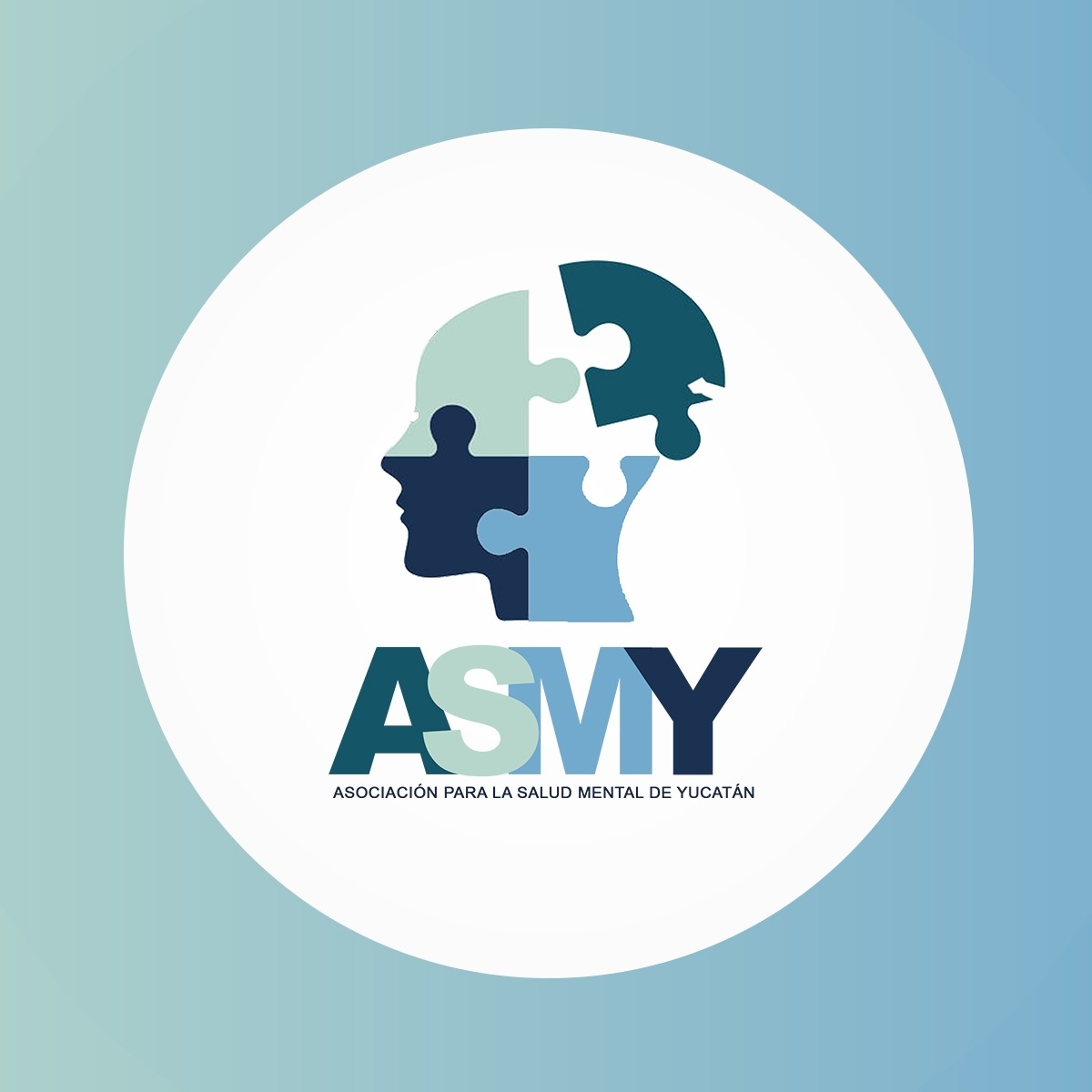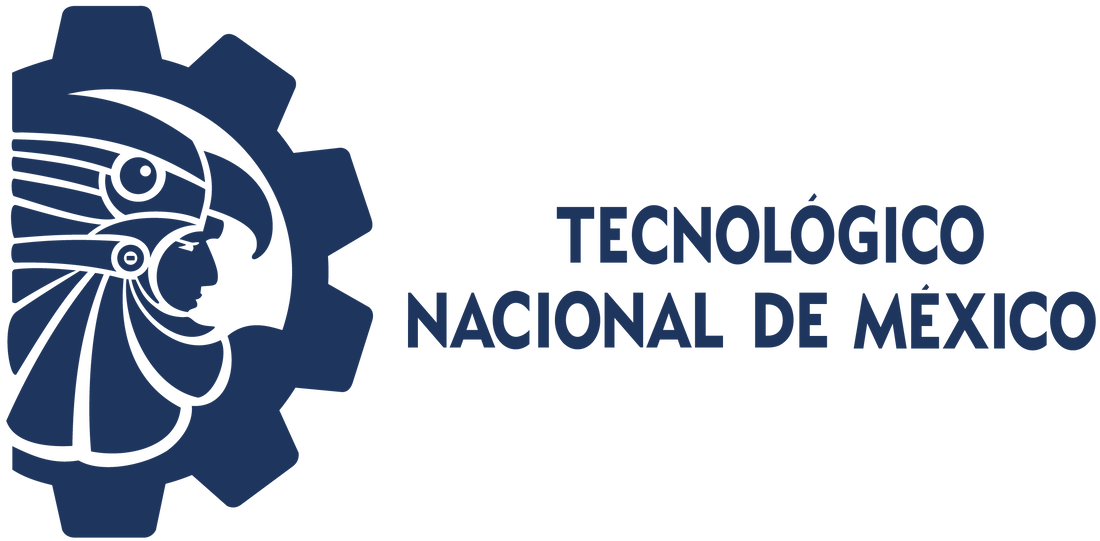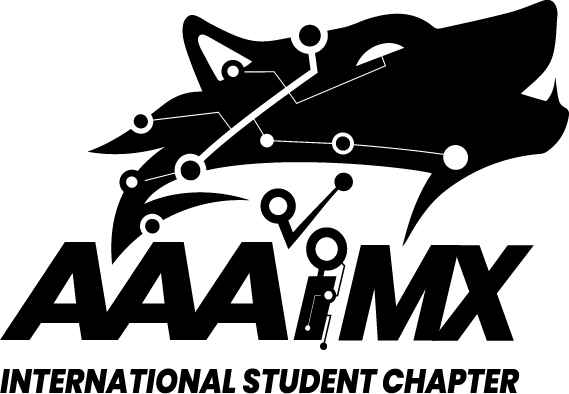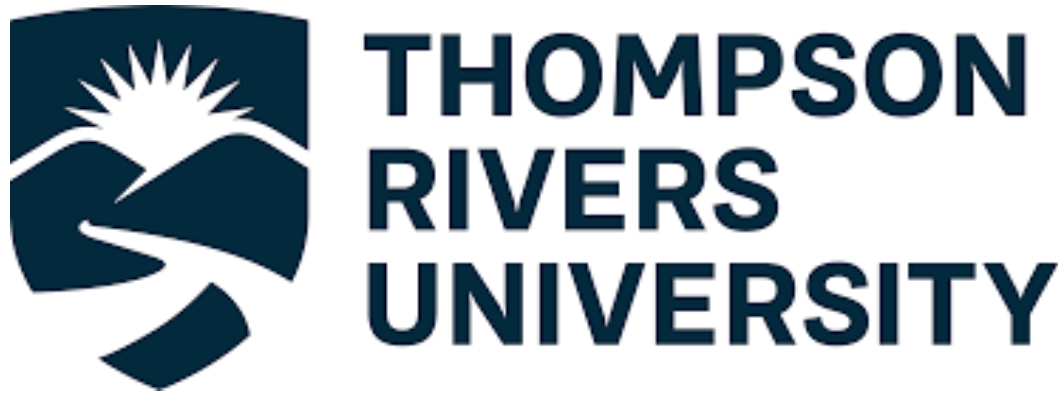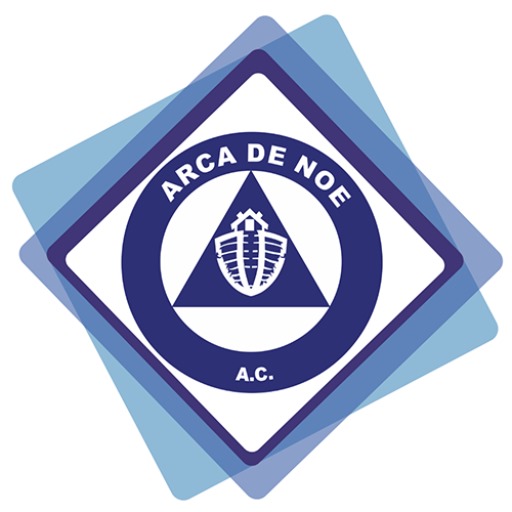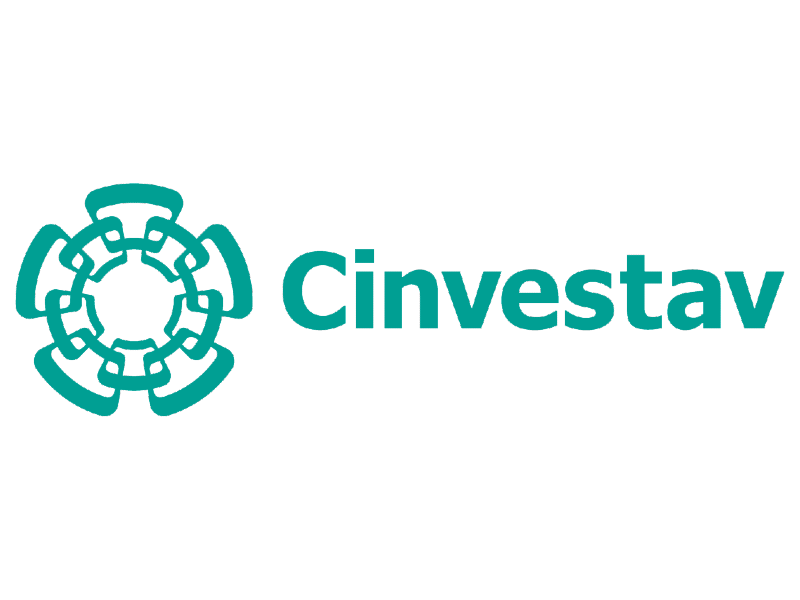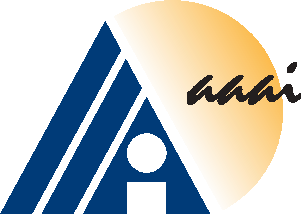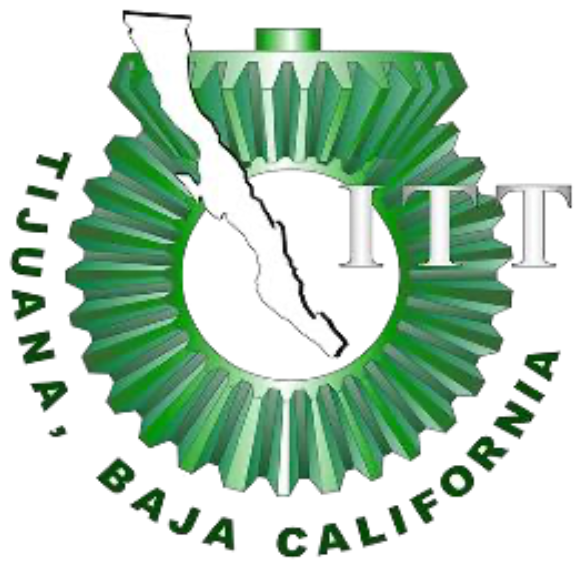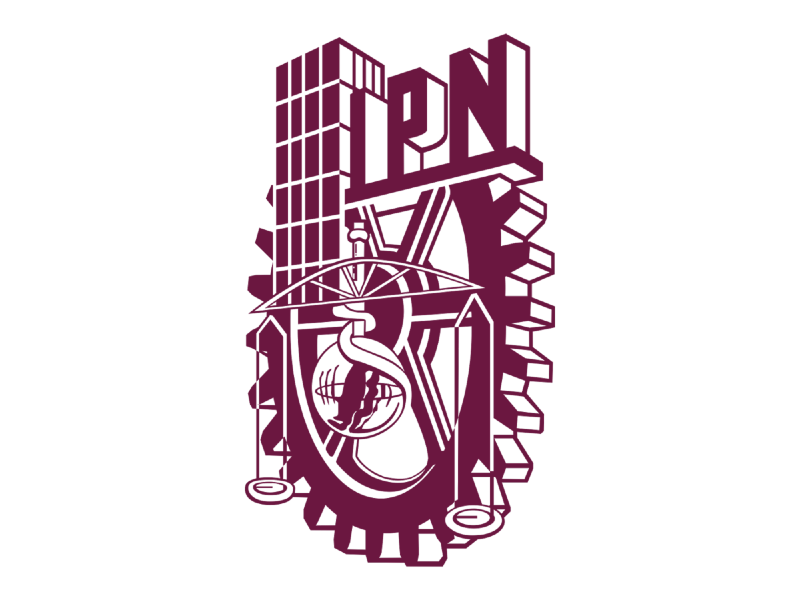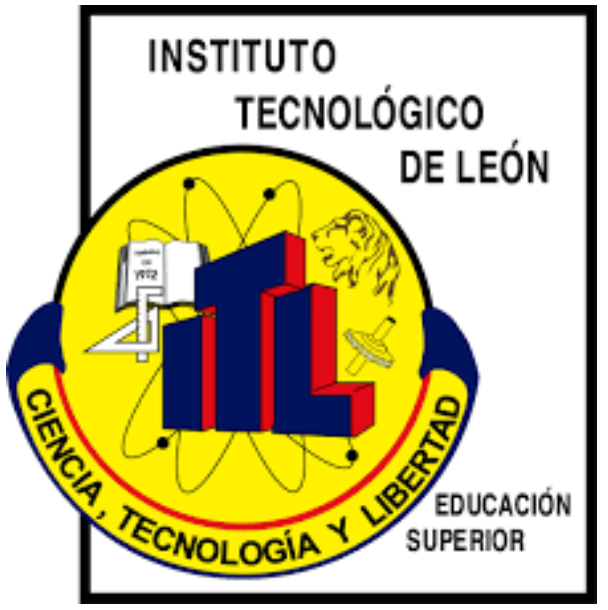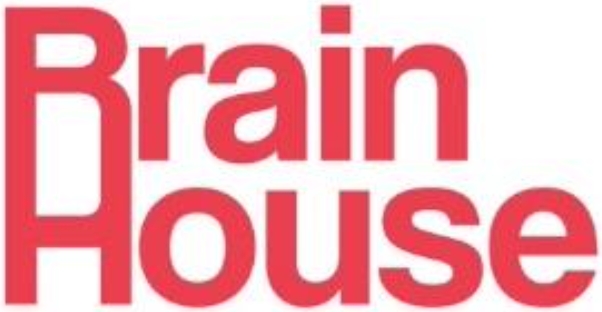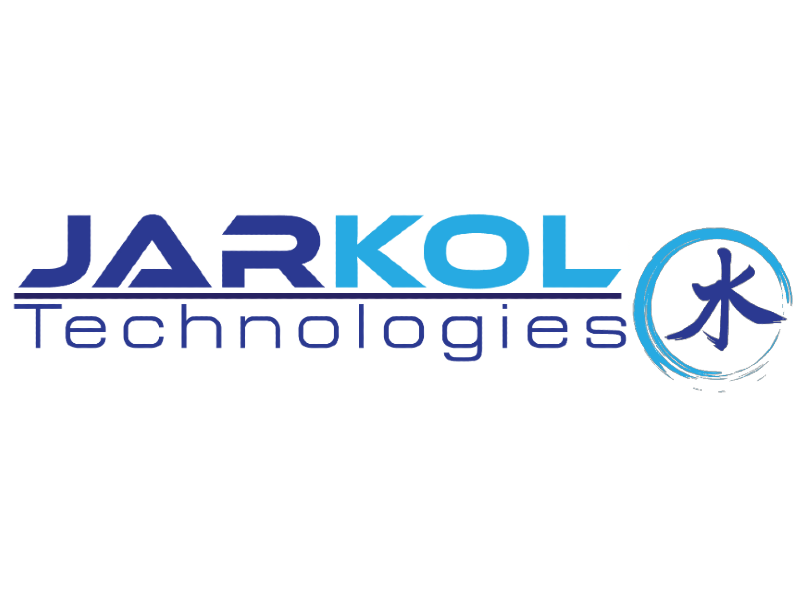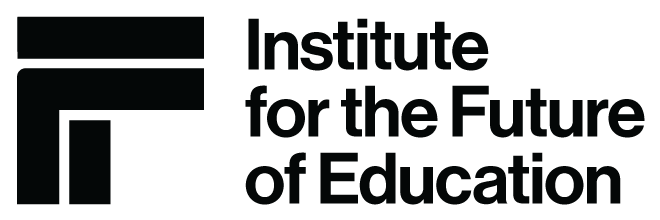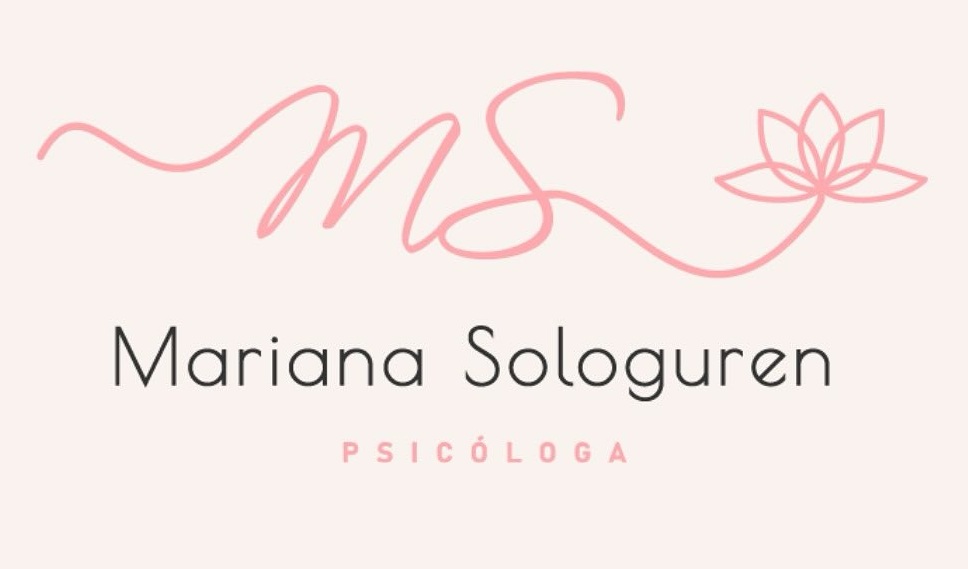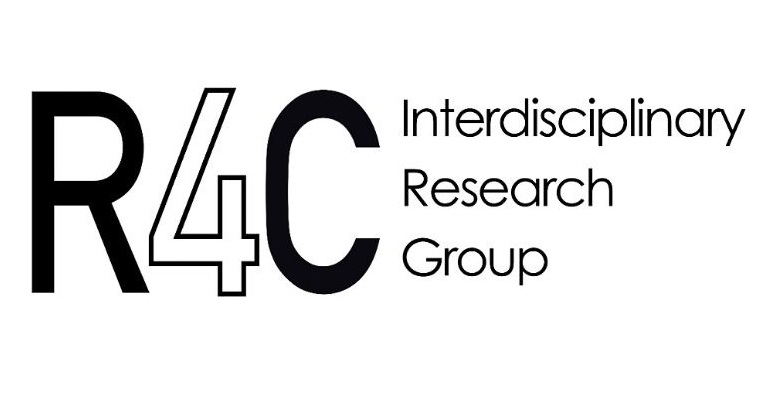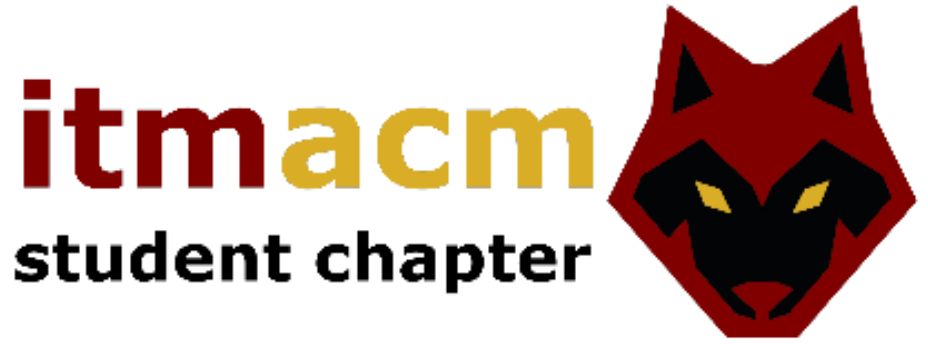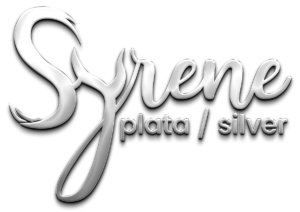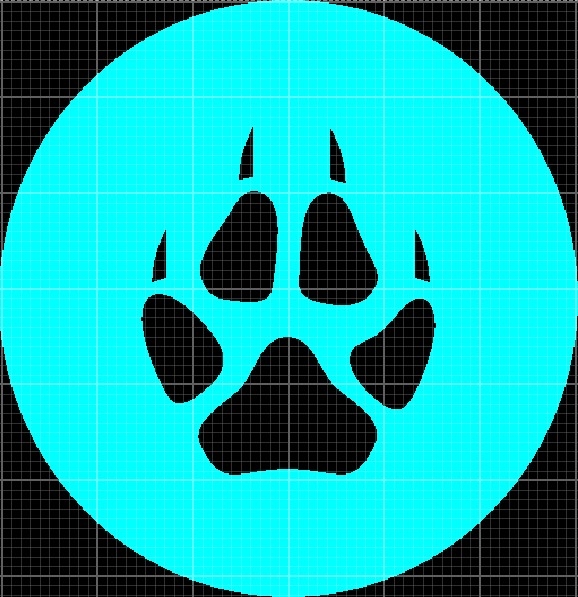Venue
We are pleased to announce that ICAIMH 2025 will be held in Mérida, Yucatán, México. The conference will take place at the Anáhuac Mayab University. The Anáhuac Mayab University is a private institution of higher education located in Mérida, Yucatán, México. The university is part of the Universidad Anáhuac network, which is one of the most prestigious private educational institutions in México. The Anáhuac Mayab University is located in the northern part of the city of Mérida, which is the capital of the state of Yucatán. Mérida is a city with a rich history and culture, and it is known for its colonial architecture, its gastronomy, and its friendly people. The city is also known for its proximity to important archaeological sites such as Chichen Itza, Uxmal, and Dzibilchaltún. Mérida is also known for its proximity to beautiful beaches such as Progreso, Celestún, and Sisal. We are looking forward to welcoming you to Mérida for ICAIMH 2025!
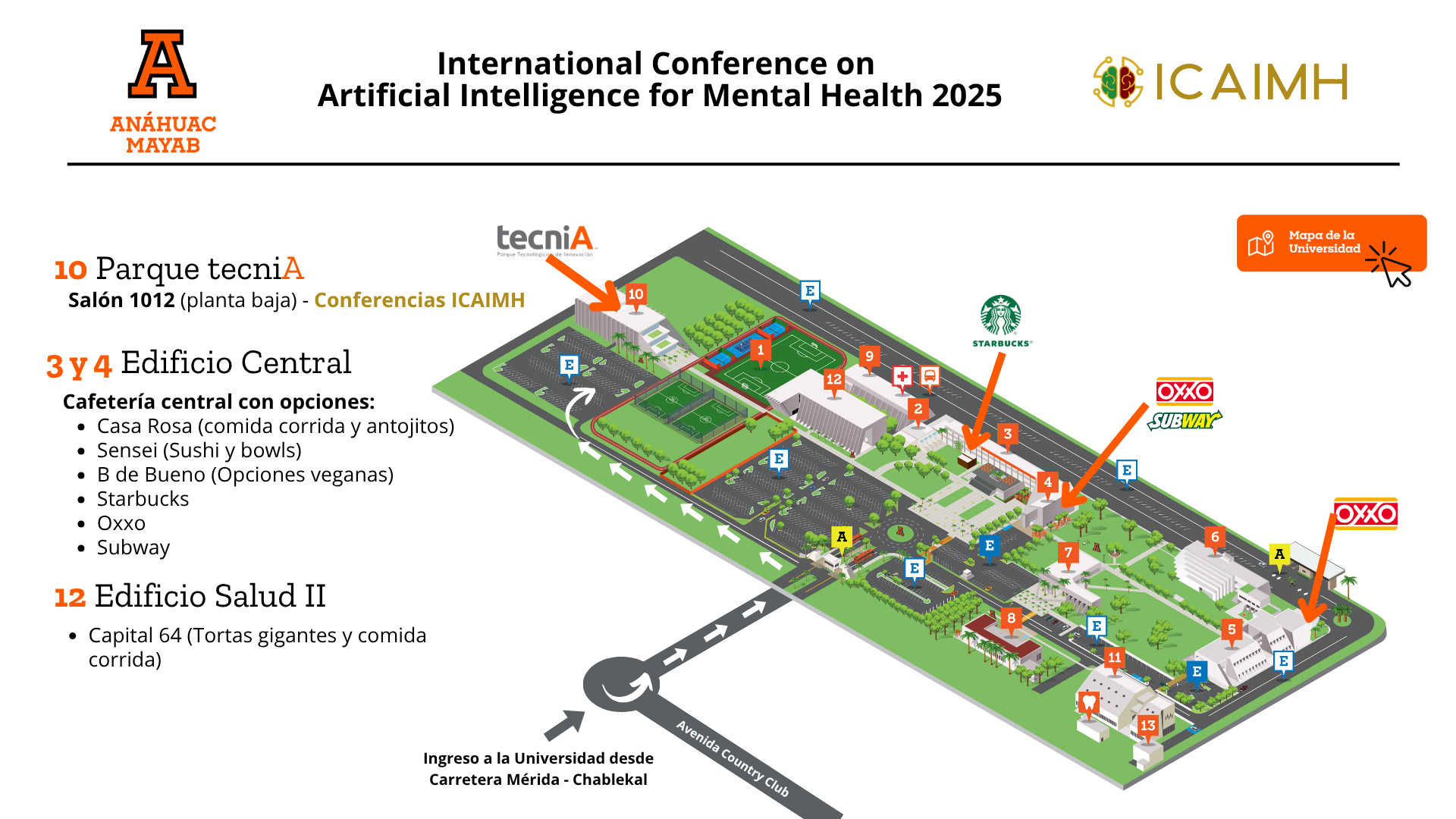
Media Impact
Press coverage
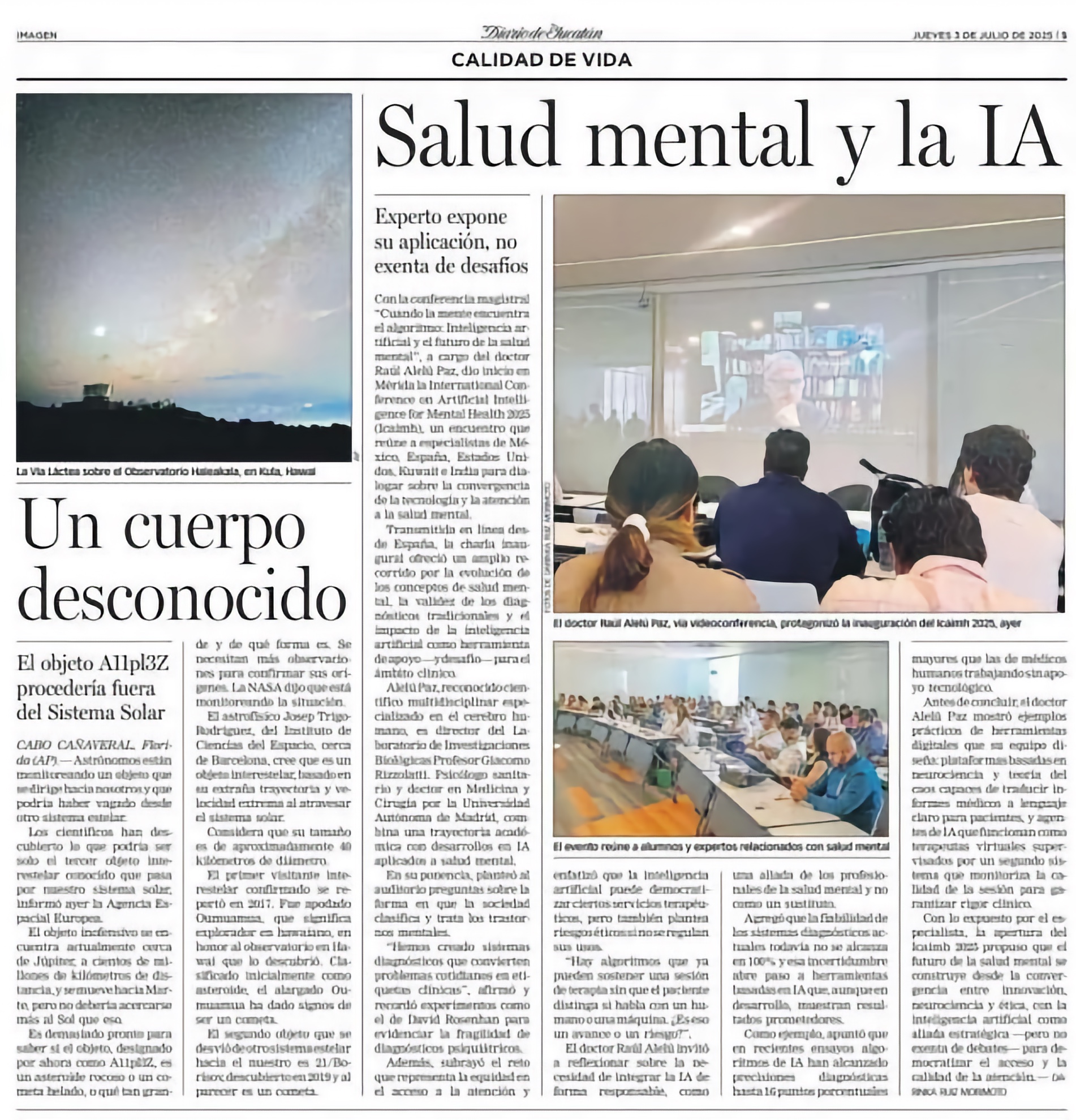
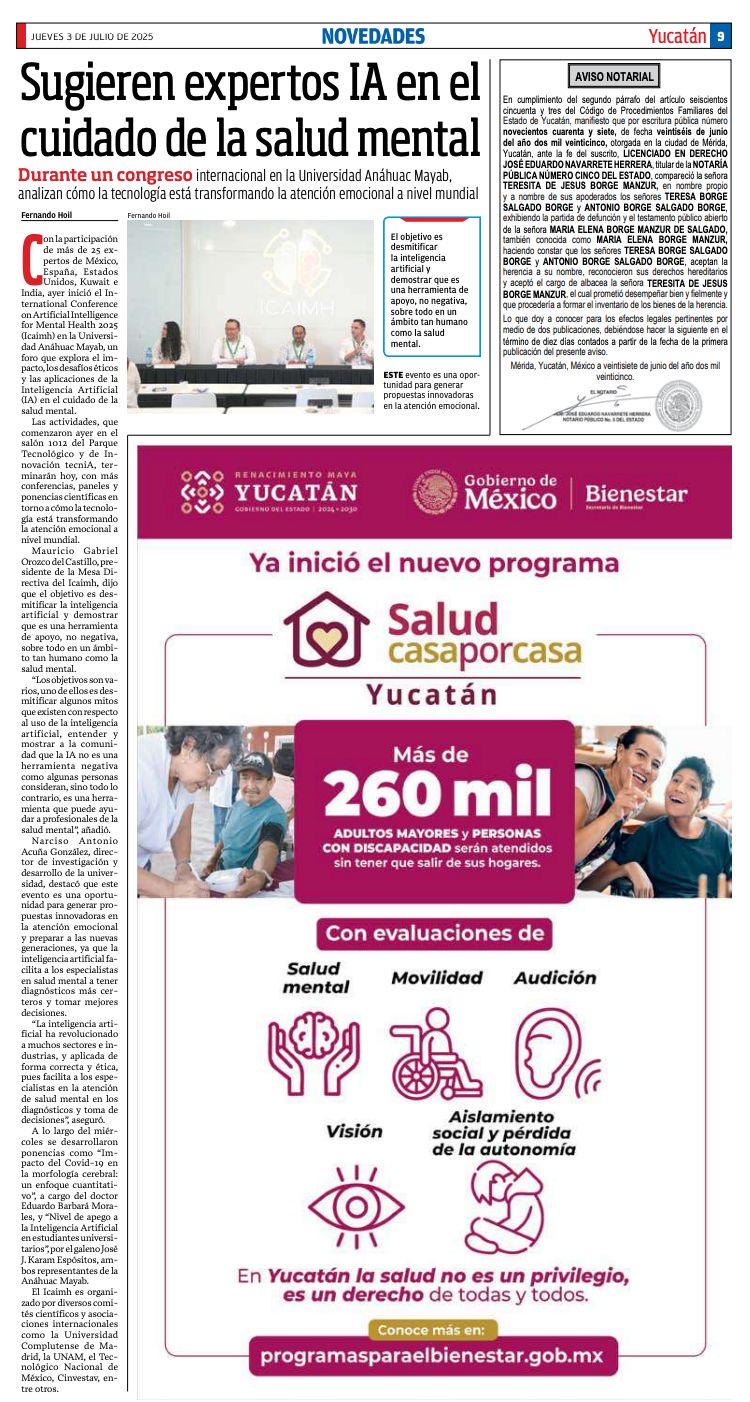
Event pictures










Call for Papers
The International Conference on Artificial Intelligence for Mental Health (ICAIMH) 2025 invites submissions that explore the transformative role of artificial intelligence in mental health. ICAIMH brings together researchers, practitioners, and industry professionals from AI, psychology, psychiatry, and healthcare to address the latest advancements, challenges, and ethical considerations in AI-driven mental health applications.
Focus Areas
We welcome full and short papers on topics including, but not limited to:
- AI-driven prevention, detection, and treatment of mental health conditions
- Natural language processing for emotion or mental health condition recognition
- Intelligent agents and chatbots for mental health support
- Expert systems in psychology and psychiatry
- Computer vision and digital image processing in neuroimaging
- Ethical considerations in AI for mental health
- Human-Computer Interaction in AI-driven mental health tools
- IoT applications for biomarker monitoring
- Pattern recognition in psychological data
- Data science for knowledge discovery in large user-generated datasets
- Machine learning applications in mental health data analysis
- Research on mental health status at various demographic levels
- Serious video game development for mental health
- Data processing and analysis focused on emotion or mental health condition recognition
Types of Submissions
ICAIMH 2025 welcomes four types of submissions:
Long Papers (8-12 pages)
Full research papers presenting original, high-quality contributions.
- The most outstanding submissions will be considered for publication in Inteligencia Artificial, a JCR-indexed international open-access journal.
- Submissions can be written in English or Spanish.
- If a submission is not among the top-ranked for Inteligencia Artificial but still demonstrates significant academic merit, the authors will be given the option to have their work considered for publication in the Journal of Artificial Intelligence in Computing Applications (JAICA) after receiving notification of acceptance.
- Since JAICA only accepts publications in English, if a submission originally written in Spanish is accepted for JAICA, the authors will be required to provide an English version for the camera-ready submission. To facilitate this process, the JAICA editorial team will offer support in translation.
- Conference Abstract Requirement: Authors of all long papers must also submit a conference abstract (1-2 pages), which will be included in a Special Issue of JAICA, serving as the official conference proceedings of ICAIMH 2025. Conference abstracts must be written in English, regardless of the original language of the main paper.
Expanded Abstracts (4-6 pages)
Articles presenting preliminary results, novel ideas, or significant perspectives.
- Accepted expanded abstracts will be published as part of the Special Issue in JAICA.
- Since these submissions are not published elsewhere, they do not require a separate conference abstract.
Critical Position and Perspective Papers (CPPP) (8-12 pages)
Submissions discussing theoretical perspectives, ethical considerations, or potential applications of AI in mental health without requiring experimental validation.
- CPPP submissions will be published exclusively in JAICA and will not be considered for Inteligencia Artificial.
- Conference Abstract Requirement: A conference abstract (1-2 pages) must be submitted and will be included in the conference proceedings. Conference abstracts must be written in English, regardless of the original language of the main paper.
Oral Presentations for Previously Published Work
Submissions of previously published papers to be presented orally at the conference.
- ICAIMH 2025 welcomes submissions for oral presentations of papers that have been published elsewhere within the past year (from July 2024 onwards).
- These papers will not be republished but will provide an opportunity for selected authors to present their work to the ICAIMH audience and foster interdisciplinary discussion.
- Submissions will undergo a selection process, and only approved works will be accepted for presentation.
- Authors must provide the DOI of the published article as part of their submission.
- All authors of the original paper must provide explicit consent via a signed letter confirming their agreement to have their work presented at ICAIMH 2025.
- Conference Abstract Requirement: A conference abstract (1-2 pages) must be submitted, which will be included in the conference proceedings. Conference abstracts must be written in English, regardless of the original language of the main paper.
Submission Guidelines
All submissions must be formatted according to the official ICAIMH 2025 templates, available in Word and LaTeX. The use of LaTeX is strongly recommended for ease of formatting and compliance with publication standards.
Formatting Requirements
Authors must use the appropriate ICAIMH 2025 template based on their submission type:
| Template Type | Long Papers | Expanded Abstracts | CPPP | Conference Abstracts |
|---|---|---|---|---|
| LaTeX project | Download | Download | Download | Download |
| Overleaf template | Open | Open | Open | Open |
| Word template | Download | Download | Download | Download |
Required Documents Based on Submission Type
| Submission Type | Required Documents |
|---|---|
| Long Papers (8-12 pages) | Full Paper (PDF) + Conference Abstract (1-2 pages, PDF) |
| Expanded Abstracts (4-6 pages) | Expanded Abstract (PDF) |
| CPPP (8-12 pages) | Full Paper (PDF) + Conference Abstract (1-2 pages, PDF) |
| Oral Presentations for Previously Published Work | Conference Abstract (1-2 pages, PDF) + DOI of Published Paper + Signed Consent Letter from All Authors |
Submission Process
ICAIMH has partnered with the Journal of Artificial Intelligence and Computing Applications (JAICA) to handle all ICAIMH 2025 submissions. Submissions must be made electronically via the JAICA submission platform: https://maikron.org/jaica/index.php/ojs/icaimh2025
Step 1: Create an Account
- Authors must register an account on the JAICA platform before submitting.
- If you already have an account, simply log in and proceed with your submission.
Step 2: Select the Correct Submission Category
During submission, authors must select the appropriate section for their work:
| ICAIMH 2025 - Long Papers |
| ICAIMH 2025 - Expanded Abstracts |
| ICAIMH 2025 - CPPPs (Critical Position and Perspective Papers) |
| ICAIMH 2025 - Oral Presentations |
Step 3: Upload Your Files (Double-Blind Review Process)
- Only PDF files should be uploaded at this stage. Source files (LaTeX/Word) will be requested only for accepted submissions.
- Ensure that no author names or identifying information appear in the document, maintaining compliance with the double-blind review process.
- Submissions that do not follow this guideline will be desk-rejected.
Step 4: Camera-Ready Version (For Accepted Submissions)
- You must submit the source files (LaTeX or Word) following the ICAIMH 2025 formatting guidelines.
- The ICAIMH and JAICA editorial teams will assist in the final publication process, considering authors' compliance with reviewer comments and conference requirements.
Publication Cost
To ensure the quality and sustainability of ICAIMH 2025, a publication fee of $1,000 MXN will be required for each accepted submission.
This fee covers:
- Publication in one of the conference's associated journals (Inteligencia Artificial or JAICA).
- Certificate of participation.
- Welcome kit.
Payment details and invoicing instructions will be provided to authors upon acceptance of their submission.
For questions regarding payment or billing, please contact us at icaimh2025@icaimh.org.
Important Dates
Submission Deadline
May 2, 2025
May 9, 2025
Notification of Acceptance
May 16, 2025
May 23, 2025
Camera-Ready Submission
June 2, 2025
June 9, 2025
We look forward to your contributions to ICAIMH 2025, where research innovations in AI for mental health will continue to push the boundaries of interdisciplinary collaboration.
For inquiries, please contact icaimh2025@icaimh.org
SCHEDULE
Recepción
Bienvenida
Ponencia de Apertura: "Cuando la mente encuentra el algoritmo: Inteligencia Artificial y el futuro de la Salud Mental"
10:00 - 11:00Coffee Break
Mesa Panel: "La Inteligencia Artificial como Herramienta para Abordar los Desafíos en Salud Mental: Un Debate Multidisciplinario"
11:30 - 12:30Ponencia Invitada: "Impacto del COVID-19 en la morfología cerebral: un enfoque cuantitativo"
12:30 - 13:00Lunch Break
Sesión 1: Herramientas de diagnóstico y detección mediante IA
Detección automatizada de niveles de ansiedad académica: Propuesta de un sistema experto basado en el aprendizaje automático para entornos educativos y clínicos
14:30 - 14:45El papel de las principales variables sociodemográficas en la detección de ideas suicidas utilizando aprendizaje automático
14:45 - 15:00Detección de personas con fobia social utilizando algoritmos de clasificación de posición pupilar
15:00 - 15:15Análisis de la calidad del sueño de los estudiantes universitarios de diferentes áreas de conocimiento utilizando un enfoque de minería de datos
15:15 - 15:30Panel de debate: Herramientas de diagnóstico y detección mediante IA
15:30 - 16:00Coffee Break
Sesión 2: IA Conversacional y Entornos Virtuales para la Salud Mental
Retroalimentación automática a través del procesamiento del lenguaje natural utilizando un paciente simulado basado en Chatbot (PEPE) para la capacitación de profesionales de la salud mental
16:30 - 16:45Una metodología para el desarrollo de juegos serios para la estimulación cognitiva de personas mayores con deterioro cognitivo leve
16:45 - 17:00Agente conversacional para psico-oncología basado en manuales de terapia de aceptación y compromiso
17:00 - 17:15Nivel de apego a la Inteligencia Artificial en estudiantes universitarios
17:15 - 17:30Panel de debate: IA conversacional y entornos virtuales para la salud mental
17:30 - 18:00Clausura Primer día
Ponencia Invitada: "¿Puede una máquina sostener el alma? Salud mental y los vínculos en la era de la Inteligencia Artificial"
09:00 - 09:30Sesión 3: Predicción de la salud mental mediante IA
Del algoritmo a la interpretación clínica de la ansiedad en el parto: análisis y explicabilidad de modelos predictivos obstétricos basados en indicadores psicológicos
09:30 - 09:50Propósito en la evaluación de la vida con inteligencia artificial: un enfoque contextual de la salud mental en estudiantes universitarios
09:50 - 10:10Reconocimiento multimodal de emociones para agentes virtuales empáticos en intervenciones de salud mental
10:10 - 10:30Panel de debate: Predicción de la salud mental mediante IA
10:30 - 11:00Coffee Break
Sesión 4: Identificación de patrones de salud mental mediante IA
Análisis de los patrones municipales de suicidio y depresión en México: un enfoque de red multicapa
11:30 - 11:50Relación entre el compromiso académico y el síndrome de agotamiento en estudiantes mexicanos: un análisis PLS-SEM
11:50 - 12:10Evaluación del estado cognitivo de las personas con demencia utilizando el tiempo de reacción de las tareas de interacción táctil: un estudio preliminar apoyado por el aprendizaje automático y la ciencia de datos
12:10 - 12:30Panel de debate: Identificación de patrones de salud mental mediante IA
12:30 - 13:00Lunch Break
Ponencia de Cierre: "Cuando las máquinas deciden: Ética y responsabilidad en la era de la Inteligencia Artificial"
14:30 - 15:30Foro abierto de la comunidad ICAIMH
15:30 - 16:00Clausura y menciones a los mejores trabajos
PROGRAM CHAIRS
Mauricio Gabriel
Orozco-del-Castillo
Researcher
Tecnológico Nacional de México/Instituto Tecnológico de Mérida, Mexico.
Juan Antonio
Recio-García
Researcher
Universidad Complutense de Madrid.
Pedro
Ortiz-Sánchez
Researcher
Tecnológico Nacional de México/Instituto Tecnológico de Mérida, Mexico.
PROGRAM COMMITTEE
(Tentative)
Samer
Ortiz-Hassan
Universidad Complutense de Madrid, Spain.
Harvard University, USA.
Mónica
García-Domínguez
Tecnológico Nacional de México, México.
Lucia Alejandra
Dzul-Sánchez
Asociación para la Salud Mental de Yucatán, México.
Stelios
Kapetanakis
University of Brighton, United Kingdom.
Ana
Martín-Casado
Universidad Internacional de La Rioja (UNIR), Spain.
Rasikh
Tariq
Tecnológico y de Estudios Superiores de Monterrey (ITESM), Mexico.
Rodolfo David
Fallas-Soto
Universidad de Costa Rica. Costa Rica.
Sergio Mauricio
Martínez-Monterrubio
Universidad Internacional de La Rioja (UNIR), Spain.
Diego M.
López-Gutiérrez
Universidad del Cauca, Colombia.
Susana
Bautista-Blasco
Universidad Francisco de Vitoria, Spain.
Ulises
Xolocotzin-Eligio
Centro de Investigación y de Estudios Avanzados (CINVESTAV). México.
Albert
Fornells-Herrera
Universidad Ramon Llull, Spain.
Juan Carlos
Valdiviezo-Navarro
Centro de Investigación en Ciencias de la Información Geoespacial (CentroGeo). México.
Nora
Cuevas-Cuevas
Tecnológico Nacional de México/Instituto Tecnológico de Mérida, Mexico.
Carlos
Bermejo-Sabbagh
Tecnológico Nacional de México/Instituto Tecnológico de Mérida, Mexico.
Marta
Caro-Martinez
Universidad Complutense de Madrid, Spain.
Israel
Sánchez-Domínguez
Universidad Nacional Autónoma de México (UNAM), México.
Guillermo
Jiménez-Díaz
Universidad Complutense de Madrid, Spain.
Carlos
Ortiz-Alemán
Centro de Investigación Científica de Yucatán (CICY), México.
Arnulfo
Alanís-Garza
TecNM/Instituto Tecnológico de Tijuana, México.
Bogart Yail
Márquez-Lobato
TecNM/Instituto Tecnológico de Tijuana, México.
María de los Ángeles
Quezada-Cisnero
TecNM/Instituto Tecnológico de Tijuana, México.
María del Rosario
Baltazar-Flores
TecNM/Instituto Tecnológico de León, México.
Carlos
Couder-Castañeda
Instituto Politécnico Nacional (IPN), México.
Francisco J.
Andrade-Chavez
Thompson Rivers University, Canada.
Juan Carlos
Ortiz-Navarro
Universidad Juárez Autónoma de Tabasco
LOCAL ORGANIZERS
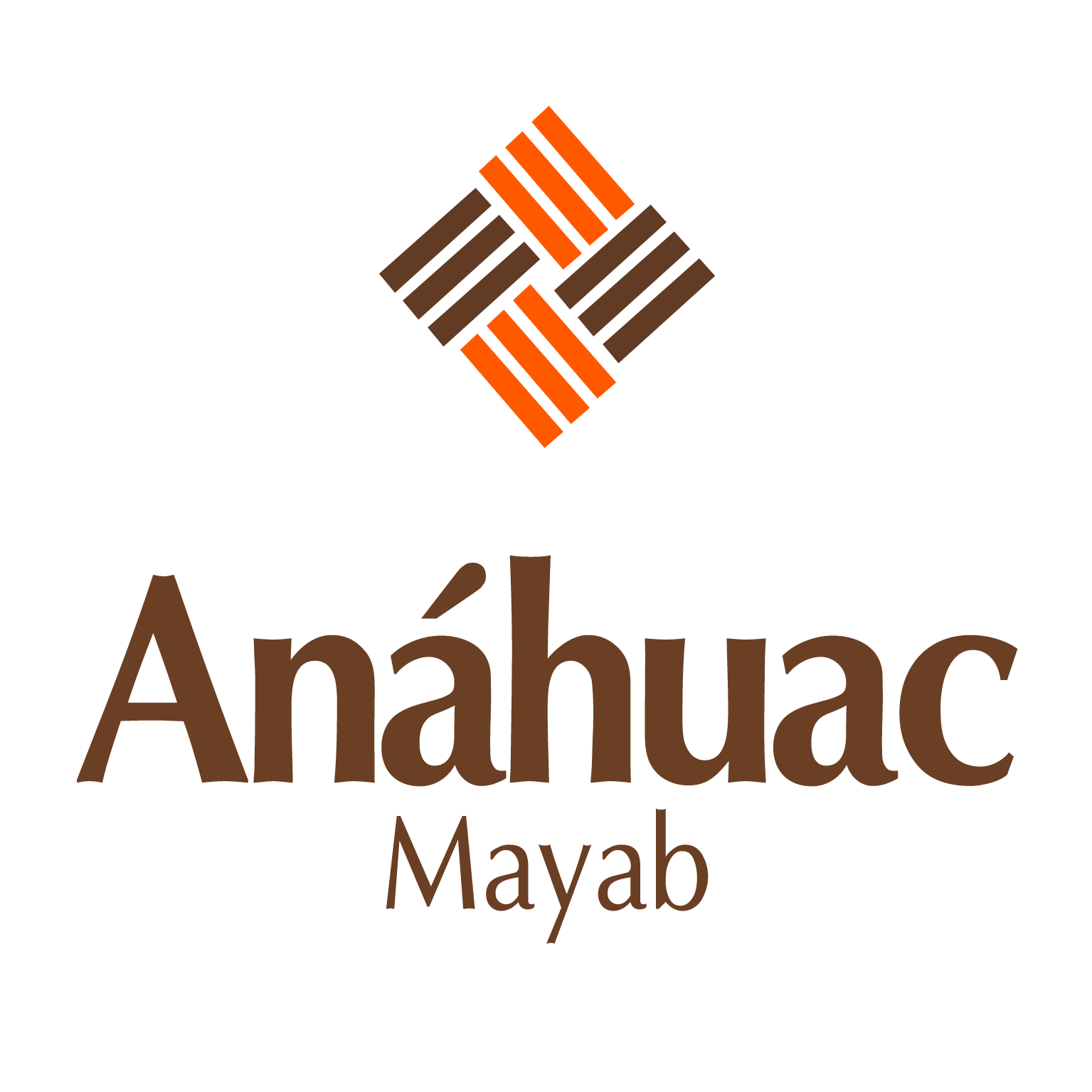
PROGRAM ORGANIZERS
Association for the Advancement of Intelligent Applications and Technologies with Social Impact
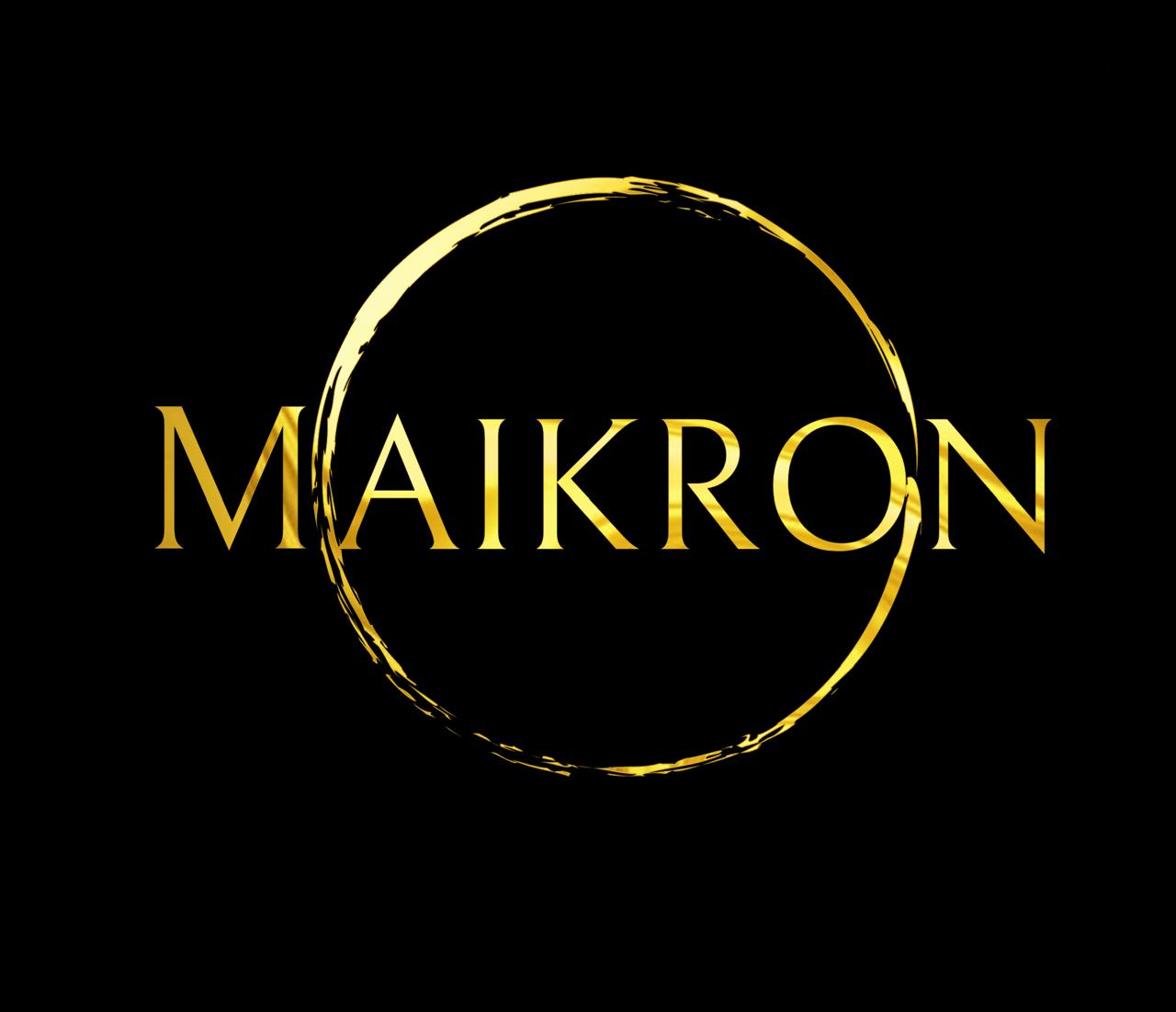
PARTNERS/SPONSORS
Cátedra Extraordinaria BOSCH UCM en Inteligencia Artificial aplicada a Internet de las Cosas

STAFF
Alejandro Daniel
Espinosa-Chim
Staff
Tecnológico Nacional de México/Instituto Tecnológico de Mérida, Mexico.
Ángel Daniel
Aldaz-Carrillo
Web Developer
Tecnológico Nacional de México/Instituto Tecnológico de Mérida, Mexico.
Brayan Michel
Reyes-Castillo
Staff
Tecnológico Nacional de México/Instituto Tecnológico de Mérida, Mexico.
David Alejandro
Poot-Osorio
Staff
Tecnológico Nacional de México/Instituto Tecnológico de Mérida, Mexico.
Hannah Sofía
Navarro
Staff
Anáhuac Mayab, México.
Jenery
Bautista-Canul
Staff
Tecnológico Nacional de México/Instituto Tecnológico de Mérida, Mexico.
José Leopoldo
Cabieses
Staff
Anáhuac Mayab, México.
Juan Rafael
Almeida-Rivera
Staff
Tecnológico Nacional de México/Instituto Tecnológico de Mérida, Mexico.
Luisa Fernanda
Román-Hernández
Staff
Tecnológico Nacional de México/Instituto Tecnológico de Mérida, Mexico.
Luis
Cardeña-Ley
Staff
Tecnológico Nacional de México/Instituto Tecnológico de Mérida, Mexico.
Maria Fernanda
Aldama-Pech
Staff
Tecnológico Nacional de México/Instituto Tecnológico de Mérida, Mexico.
Mariana
García-Álvarez
Staff
Anáhuac Mayab, México.
Natalia
Nakamura-Chocolatl
Staff
Anáhuac Mayab, México.
Yuly Brigith
Ocampo-Valencia
Staff
Universidad de Cundinamarca. Colombia.
